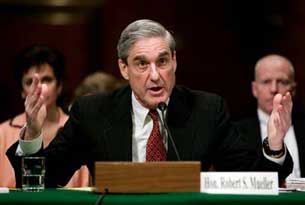
Documents provided Thursday to House Democrats by FBI Director Robert Mueller reinforced the sense among Democrats and critics of the Bush Administration that Alberto Gonzales may have perjured himself before the Senate Judiciary committee. Last month, Gonzales testified before the committee about a March 10, 2004 visit he and then White House chief of staff Andrew Card paid to Ashcroft’s hospital room to talk about a secret surveillance program.
“Director Mueller’s notes and recollections concerning the White House visit to the Attorney General’s hospital bed confirm an attempt to goad a sick and heavily medicated Ashcroft to approve the warrantless surveillance program,” said Rep. John Conyers (D-MI), chairman of the House Judiciary Committee, who requested Mueller’s notes last month.
Particularly disconcerting is the new revelation that the White House sought Mr. Ashcroft’s authorization for the surveillance program, yet refused to let him seek the advice he needed on the program.
The heavily redacted notes shed no further light upon other aspects of the controversy, including Gonzales’ contention that the source of the discord was not the NSA’s warrantless wiretapping program, but another surveillance program that he refused to identify.
In response to questions from Sen. Arlen Specter (R-PA), Gonzales insisted that Ashcroft seemed lucid in the hospital, where the White House aides sought his reauthorization of a domestic surveillance program. “Obviously, there was concern about Attorney General Ashcroft’s condition,” Gonzales told Specter, “and we would not have sought, nor did we intend, to get any approval from… Ashcroft if, in fact, he wasn’t fully competent to make that decision.”
But Mueller’s notes belie that contention. One sentence notes, “AG in chair; is feeble, barely articulate, clearly stressed.”
Mueller divulged the existence of his notes in his own testimony before Conyers’ committee on July 26 in an exchange with Rep. Arthur Davis (D-AL). Davis asked Mueller whether he’d taken notes about the March 2004 evening and, if he had, why.
“It was out of the ordinary,” Mueller replied.
“What was out of the ordinary Mr. Mueller?” Davis asked.
“Being asked to go to the hospital and be present at that time.”
Conyers says he will continue to explore the matter of Ashcroft’s health, but that he will also seek unredacted versions of Mueller’s notes to clear up still-unclear related issues.
“We intend to fully investigate this incident and the underlying subject matter that evoked such widespread distress within the Department and the FBI. We will be seeking an unredacted copy of Director Mueller’s notes covering meetings before and after the hospital visit and expect to receive information from several of the individuals mentioned in the document.”
Individuals mentioned in Mueller’s notes include Vice President Dick Cheney, then-NSA Director Gen. Michael Hayden, then-Deputy CIA Director John McLaughlin, and then-CIA Director George Tenet.















